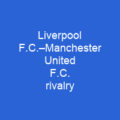Manchester City Football Club: A Century of Glory
Imagine a club that has been around for over a century, with a rich history and a legacy that spans generations. That’s Manchester City Football Club (FC), a professional football club based in Manchester, England.
The Early Years: From St. Mark’s to Manchester City
Founded in 1880 as St. Mark’s (West Gorton), the club underwent several name changes before settling on Manchester City FC. The journey from a small local team to one of England’s most successful clubs is nothing short of remarkable.
The Rise and Fall: A Tale of Success and Decline
Have you ever wondered how a club can rise so high only to fall just as quickly? Manchester City FC has experienced both extremes. In the late 1960s and early 1970s, under Joe Mercer and Malcolm Allison, they tasted success with multiple league titles and FA Cups.
However, the 1980s saw a decline in fortunes. Despite the club’s financial investment post-2008, it took several years to regain its former glory. The journey back to the top tier was not easy, but it paved the way for unprecedented success under Pep Guardiola.
The Sheikh Mansour Era: A New Dawn
When Sheikh Mansour took over in 2008, Manchester City FC entered a new era. The club’s financial investment led to a flurry of high-profile player signings and unprecedented success. From multiple league titles to the UEFA Champions League, the club has been on a winning streak ever since.
Under Pep Guardiola, Manchester City won four consecutive Premier League titles from 2020-21 to 2023-24. The team’s achievements in domestic competitions and European football have made them one of the most successful clubs in recent years.
The Future: A New Stadium and Beyond
With plans for an expanded North Stand, Manchester City FC is looking to the future with optimism. The Etihad Stadium will soon accommodate up to 61,000 fans, making it one of the largest stadiums in England.
The club’s ownership and management continue to invest in the team, ensuring that Manchester City remains a force to be reckoned with on both domestic and international stages. The future looks bright for this iconic club.

Conclusion
Manchester City FC’s journey is a testament to the power of perseverance and strategic investment. From its humble beginnings as St. Mark’s (West Gorton) to becoming one of England’s most successful clubs, Manchester City has come a long way.
The club’s rich history, combined with its current success under Pep Guardiola, makes it a true powerhouse in the world of football. As they continue to grow and evolve, Manchester City FC remains a shining example of what can be achieved through hard work and dedication.
You want to know more about Manchester City F.C.?
This page is based on the article Manchester City F.C. published in Wikipedia (retrieved on February 20, 2025) and was automatically summarized using artificial intelligence.







